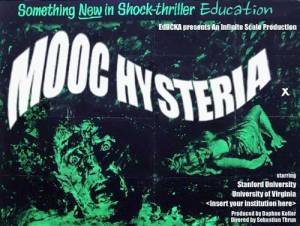Recently interest in MOOCs (Massive Open Online Courses) has moved from the learning technology community into the popular press. Some of the coverage has been almost apocalyptic in tone.

http://cogdogblog.com/2012/07/17/mooc-hysertia/
This post, the first of a series of three on this topic, aims to provide an introduction to MOOCs. The next two posts will cover (i) some of the pedagogic aspects and (ii) some of the business models which have been suggested as ways to exploit the MOOC phenomenon.
The overarching aim of this short series is to provide some resources on the MOOCs, to explore some questions about them and to invite some comments about their potential impact .
A list of current and recent MOOCs can be found here. A more detailed survey of the development of MOOCs thus far can be accessed on this link
What are MOOCS?
The term MOOCs emerged in 2007. One of the MOOC pioneers, George Siemens talks about the genesis and development of the MOOC on this video where Martin Weller interviews George Siemens and Dave Cormier (originator of the term MOOC). Building on Connectivist principles developed by Stephen Downes, early MOOCs challenged universities’ traditional control over curriculum, certification, tuition fees and access.
A great paper by Sir John Daniel draws an important distinction between these early cMOOCs, which continue, and those which have been the focus of recent press attention, which he calls xMOOCs, such as those provided by Cousera, Udacity and edX (though there are significant differences between the pedagogic and economic models each of these seeks to develop). It is
- the vast number of student enrolments,
- considerable investment of venture capital,
- global publishing conglomerate interest
- Ivy League and Russell Group University participation
in these xMOOCs which has grown media interest and led some to argue that, largely due to MOOCs, Higher Education is on the verge of a profound transformation (the-most-important-education-technology-in-200-years/, ) whilst others are more sceptical.
The next post will look in more detail at how both types of MOOC (C and X) work and some of the pedagogic models which underpin them. The final post will explore their viability as business models.
If you have any thoughts or comments on MOOCs, please share them below.



Leave a Reply